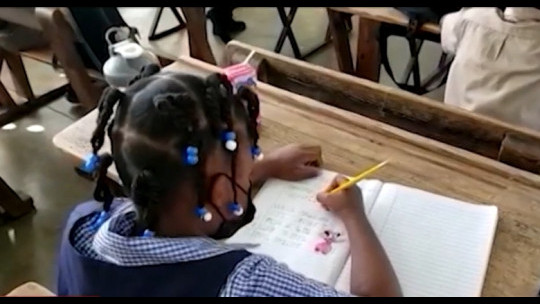.png)
00:00
00:00
00:00
By Camille Williams
Improving learning outcomes has again been thrust into the spotlight with the release of this year's Caribbean Secondary Education Certificate (CSEC) results.
The Ministry of Education revealed that of the Jamaican students who sat CSEC Mathematics this year, 38.9 per cent received a pass.
For English A, 76.4 per cent of students received passes.
Suggestions for improving student performance have included an overhaul of primary education and the deployment of more specialist teachers in subjects like math and science.
But one aspect of the conversation that requires exploring is how to support children with learning disabilities.
An estimated 20 per cent or one in five people have dyslexia worldwide.
Dyslexia is a language-based learning disability which results in difficulties reading, writing, spelling and even pronouncing words.
According to the International Dyslexia Association, of the students with specific learning disabilities receiving special education services, 70-80 per cent have deficits in reading.
The Society for Education and Technology (SET) Foundation offers screening for dyslexia to schools and universities in Jamaica.
Co-founder Paula Dixon shared some of the foundation's findings:
"Kids in grade two are struggling with rhyming. And the schools were shocked for us to say that because they were wondering why the children were finding this difficult.... A lot of children tend to have working memory issues [and] they're not sure why. But the memory issues of retaining and remembering stuff is poor. And so that's another area we have to look at why."
Dyslexia specialist, teacher and assessor Cheron Dixon has suggested teachers be trained to identify learning disabilities.
"They should be able to be aware that dyslexia exists and what are the signs of it. And when they do identify, they screen, and they do a diagnostic interview. Just ask a few questions about their learning; really simple questions to get to know the student a bit more, and then screen them for dyslexia," she proposed.
Ms. Dixon also suggested educators be equipped with adequate teaching methodologies once they've identified the learning disability.
"The teachers then need to be trained about how to teach, to do target teaching in a lesson or in a classroom. So say, for instance, they've screened the child...and the child has problems with spelling. The teacher should then know how to plan her lessons so that she can give that student targeted work to help them to improve that spelling difficulty that they may have."
SET Foundation is recommending the Ministry of Education set up intervention units at schools.
"You know, you have a literacy intervention programme unit where the children go, they're taken out of class, they go to that, they get the service they need, and then they go back into the classroom. So instead of having a separate school or a body outside of the school, just integrating, keeping everything inclusive within the school, so no one feels alone or left behind or separate from a group," Ms. Dixon reasoned.
Minister of Education and Youth Fayval Williams agrees that more could be done to respond to students with learning disabilities, but she sought to explain that there are budgetary constraints.
"I know more can always be done, but again, we have to be mindful that we're operating within budgets, but we try to maximize on our budgets," she admitted.
Mrs. Williams, who was addressing Wednesday's post-Cabinet press briefing, noted that screening of students is done as early as age 4.
"Over the last two years, we've done it every year. We have assessed age 4 children, you know, across Jamaica for early numeracy, early literacy, behavioural issues, and special needs issues. And where they're identified, we take steps to help," she said.
The Jamaica School Readiness Assessment was developed to determine children's preparedness for primary school, and screen children for developmental disability and behaviour disorders.
The aim is to allow a year for intervention prior to entry to primary level schooling.








 All feeds
All feeds







